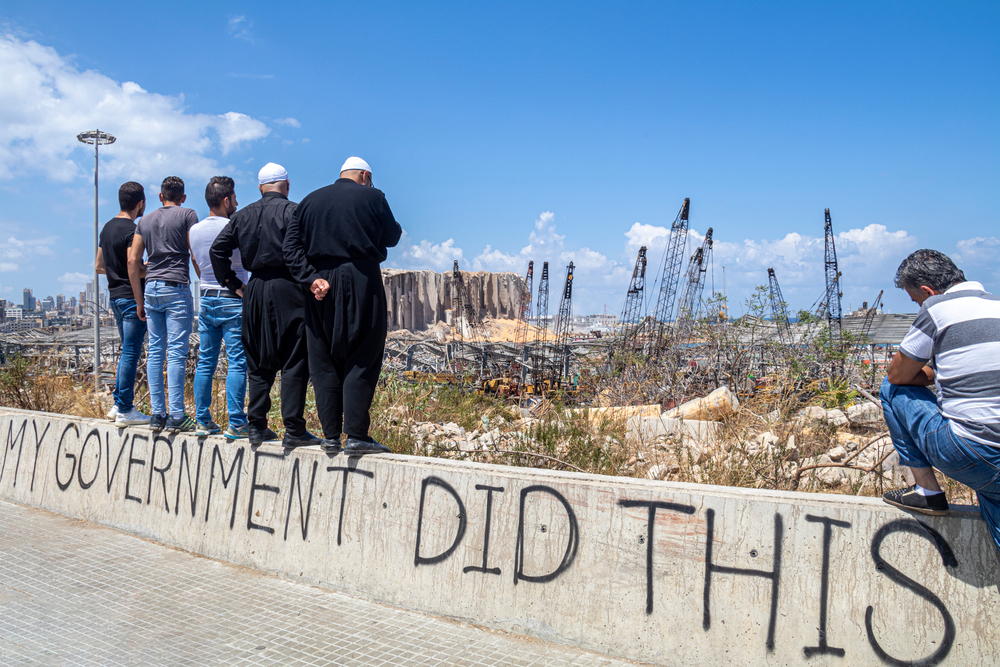Safi is Lebanese by birth and has French nationality as well. He has been working as a senior project manager at Wageningen Food & Biobased Research since 2014. He hopes the Dutch population will give money to giro 555 to support the Lebanese people. Like many Lebanese, he is angered and horrified by the current situation in Lebanon.
Disaster
The apocalyptic explosion added to a long list of disasters that have hit Lebanon during the past few years, says Safi. Lebanon is the third most-indebted country in the world, the Lebanese economy has completely collapsed, the banking system is not functioning properly despite its attractiveness, hyperinflation is driving the market, and unemployment is running at over 40 per cent. What is more, due to the war in Syria, more than a million Syrian refugees found shelter in Lebanon to escape the horror of war. This humanitarian crisis is putting tremendous additional pressure on the failing Lebanese economy, says Safi. On top of all these crises, Lebanon is facing an everlasting garbage crisis that politicians have not been capable of sorting out.
Warlords
The roots of the problem date back to 40 years ago, when Lebanon sank into a bloody civil war. ‘Most key Lebanese politicians were warlords in this war. They fought each other for almost 15 years. In the 1990s they washed their hands of all the crimes they had committed and became so-called politicians. Since then, they have been engaged in the systematic robbery of the Lebanese economy and public money. The level of corruption in Lebanon is indescribable.’
So why give money to a country like that?

‘That is a very good question. My answer is: never give money to Lebanese politicians or governmental institutions, only give money to NGOs, devastated hospitals and organizations that directly support the Lebanese population. The international community is fully aware of the situation, and most of the aid coming from abroad is being channelled through trusted NGOs or directly to the Lebanese people. All the donations to giro 555 will be given to trusted NGOs under the umbrella of the United Nations. Up to now, around four million euros have been donated and we hope to double this number by Friday 14 August.’
Should they investigate the explosion?
‘Evidence showed that key Lebanese politicians knew that a huge amount of ammonium nitrate was stored in the harbour of Beirut, close to a densely populated residential area. However, for nearly seven years nothing was done to remove these dangerous chemicals from the harbour. Therefore, the majority of the Lebanese demands an international investigation under the authority of the United Nations and the Security Council to unravel the truth about this horrific blast and bring the people responsible for this tragedy to justice. They want the politicians and former warlords to be removed and do not trust the Lebanese judiciary–everything is literally corrupt. They also want to know what triggered the explosion. Was it a terrorist act? Was it militia weapons that exploded near the stock of ammonium nitrate? Or was it an external intervention that bombed the harbour? Only international pressure and an investigation can unravel the causes of the explosion.’
What future do you see?
‘The positive aspect in Lebanon is that the majority of the Lebanese population, especially the young progressive generation, are fed up with the corrupt politicians and the political status quo. In general, the Lebanese population are highly educated, and we have to rely on their objectivity making them vote for the right politicians who can make a difference in terms of political change, reforms, and – most importantly – returning the stolen money to the Lebanese treasury.’
‘Lebanese people just want to live in peace. Forty years of unstoppable turmoil is enough, people are tired and scared of what our corrupt politicians will do next. It is important to point out that Lebanon is the most westernized country in the Middle East. Lebanon has one of the best cuisines in the world, has breath-taking touristic sites, and is among the oldest sites of wine production in the world. There is so much to say about the beauty of Lebanon.’
Are you collaborating with Lebanese partners?
‘I am currently coordinating a partnership made up of WUR, Berytech Lebanon and StartLife. The project focuses on developing start-ups and on increasing awareness on the importance of valorizing renewable resources, side streams and agricultural waste. The project is mainly funded by the Dutch embassy in Beirut and we are looking forward to long-term collaboration with Berytech.’

 Protest in Beirut. Photo: Shutterstock
Protest in Beirut. Photo: Shutterstock